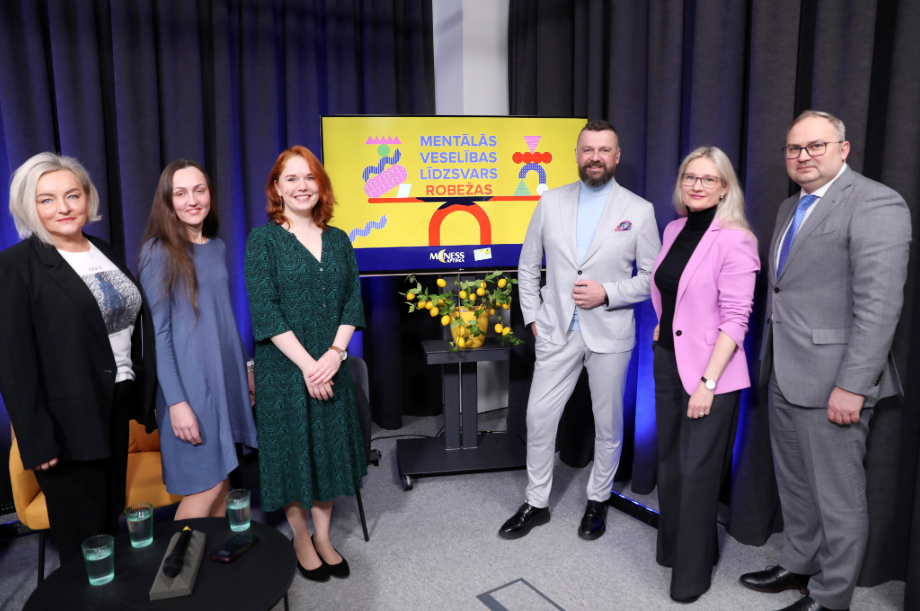
Mental health balance is fragile. It’s important to recognise the problem.
During the expert discussion “Mental Health Balance. Boundaries. How to recognise, understand and help?”, organised by “Mēness aptieka”, which focused on early recognition of mental disorders and ways to get timely help, experts stressed the importance of being honest with oneself and not pretending the problem doesn`t exist. Just as important is the attention of family members. They can notice changes in the behavior and habits of their loved ones and intervene when a person no longer feels strong enough to seek professional help.
During the discussion, experts acknowledged that despite increased media coverage of mental health issues in recent years, various awareness-raising events and a general increase in society’s knowledge of mental health and trust in professionals, stigma and lack of understanding of the importance of mental health still exist in some parts of society and prevent people from seeking help.
“These stereotypes are very much alive, but we need to break them with our attitudes, with new services, with the opportunities that are emerging, so that people can get modern treatment and not be afraid of it. Besides, not every patient needs a psychiatrist – to help the number of people who need it, specialists need to collaborate professionally, and I think things are going in the right direction,” says Māris Taube, professor at Riga Stradiņš University and psychiatrist at the National Center for Mental Health.
Marija Ābeltiņa, doctor of psychology, clinical psychologist, certified cognitive behavioural therapist and supervisor, describes being approached by people who are unwell for various reasons - some are unable to do what they used to do, others feel unhappy with themselves, unable to achieve what they want, some are in a crisis situation or on the contrary come with the belief: “I don’t have any problems, my family brought me here!”, but for all of them, this meeting with a professional is very important right from the start. “The first thing I always remind people is not to lie to themselves that everything is fine. It is important to acknowledge the problem and then you can take the next step and seek for help.”
Experts remind that mental health problems can be hidden behind sleep disturbances, excessive fatigue, feelings of anxiety, fear, loss of interest, loss of energy and worsening family and work relationships.
Evita Lārmane, a pharmacist at “Mēness aptieka”, in her daily work has noticed that many people feel stressed and are unable to relax. After speaking with the customer or noticing that the customer regularly returns to purchase additional stress relief products, can be a sign that the person needs professional help, and pharmacist always encourages them to seek it. “We often see people who have been taking supplements for a long time, but the anxiety is still there. The person must realise that they need to get help, but it’s also the responsibility of those close to them.”
It is important to ensure support for people with mental disorders and to talk openly about these issues in the family, even if this sometimes means asking straight out: “Are you thinking of committing suicide?”, said Irena Cepurīte, co-founder of the mental health support society “Ogle”. “Unfortunately, many people today, for whatever reason, find themselves in a situation in their lives where they don`t even have the strength to get up in the morning and do the usual things, so the people closest to them have a very important role to play in helping them find a doctor and making sure they are safe,” added Irena Cepurīte.
A recent survey carried out by “Mēness aptieka” and the research agency Norstat shows that a tenth of the population consider their mental health to be poor in the past year. And 44% have experienced anxiety or panic attack, according to the results of the survey.
The expert discussion of “Mēness aptieka” highlighting the need for early recognition of mental disorders and knowing the possibilities for help, was attended by Marta Celmiņa, a paediatrician-sleep specialist at the Epilepsy and Sleep Medicine Centre of the Children’s Clinical University Hospital, the President of the Latvian Society of Sleep Medicine, Māris Taube, Professor of Riga Stradiņš University, psychiatrist at the National Centre for Mental Health, Marija Ābeltiņa, doctor of psychology, clinical psychologist, certified cognitive behavioural therapist and supervisor, Irena Cepurīte, co-founder of the mental health support society “Ogle”, and Evita Lārmane, pharmacist at “Mēness aptieka”. The discussion was moderated by Armands Simsons.